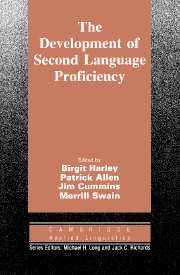Book contents
- Frontmatter
- Contents
- List of contributors
- Series editors' preface
- Acknowledgments
- Introduction
- I THE NATURE OF LANGUAGE PROFICIENCY
- Chapter 1 The nature of language proficiency
- Chapter 2 Constructing measures and measuring constructs
- Chapter 3 Communicative competence revisited
- Chapter 4 Response by DBP project members to the discussion papers of Lyle Bachman and Jacquelyn Schachter
- II CLASSROOM TREATMENT
- III SOCIAL AND INDIVIDUAL VARIABLES
- IV PRACTICAL AND POLICY IMPLICATIONS
- V THIRTY-FIVE YEARS OF RESEARCH ON BILINGUALISM
- CONCLUSION
- References
- Author Index
- Subject Index
Chapter 1 - The nature of language proficiency
Published online by Cambridge University Press: 05 October 2012
- Frontmatter
- Contents
- List of contributors
- Series editors' preface
- Acknowledgments
- Introduction
- I THE NATURE OF LANGUAGE PROFICIENCY
- Chapter 1 The nature of language proficiency
- Chapter 2 Constructing measures and measuring constructs
- Chapter 3 Communicative competence revisited
- Chapter 4 Response by DBP project members to the discussion papers of Lyle Bachman and Jacquelyn Schachter
- II CLASSROOM TREATMENT
- III SOCIAL AND INDIVIDUAL VARIABLES
- IV PRACTICAL AND POLICY IMPLICATIONS
- V THIRTY-FIVE YEARS OF RESEARCH ON BILINGUALISM
- CONCLUSION
- References
- Author Index
- Subject Index
Summary
Theoretical background
Since ancient times, philosophers and psychologists have debated appropriate ways of conceptualizing the nature of language proficiency and its relationship to other constructs (e.g., “intelligence”). The issue is not just an abstract theoretical question, but one that is central to the resolution of a variety of applied educational issues. Educational policies based on hypotheses about how language proficiency develops as a function of different classroom treatments, different experiences in the environment, and different social contexts clearly imply certain conceptions about what it means to be proficient in a language.
The context for our investigation of the nature of language proficiency will be described briefly in relation to the applied, theoretical, and methodological considerations that influenced the conceptualization and implementation of the study.
Applied issues
Several examples will serve to illustrate the point that the conceptualization of the nature of language proficiency has a major impact on a variety of practical and policy issues in education. In the area of language teaching methodology, for example, the predominant emphasis until recently has been on the teaching of grammar. The implicit conception of language proficiency, as it has been operationalized in second language classrooms, has entailed viewing proficiency as little more than grammar and lexis. The recent movement toward communicative language teaching has been associated with a broader view of language that includes not just its grammatical aspects, but also the ability to use language appropriately in different contexts and the ability to organize one's thoughts through language.
Information
- Type
- Chapter
- Information
- The Development of Second Language Proficiency , pp. 7 - 25Publisher: Cambridge University PressPrint publication year: 1990
Accessibility standard: Unknown
Why this information is here
This section outlines the accessibility features of this content - including support for screen readers, full keyboard navigation and high-contrast display options. This may not be relevant for you.Accessibility Information
- 59
- Cited by
